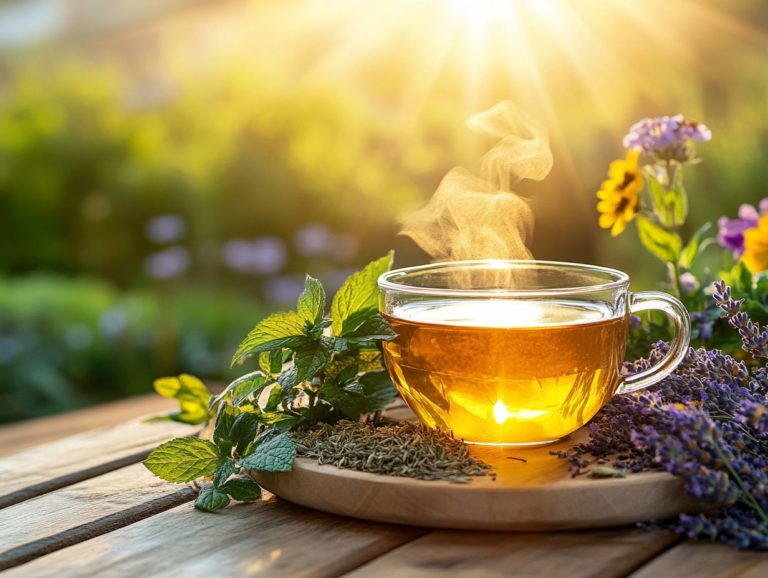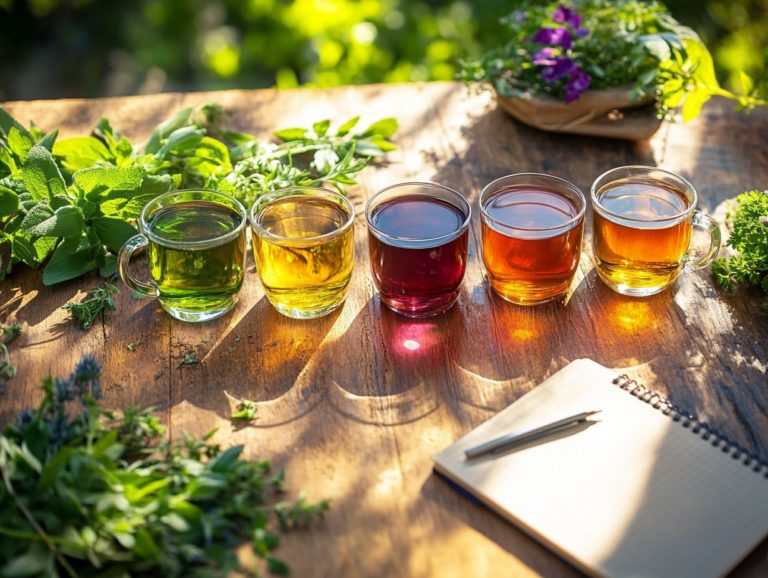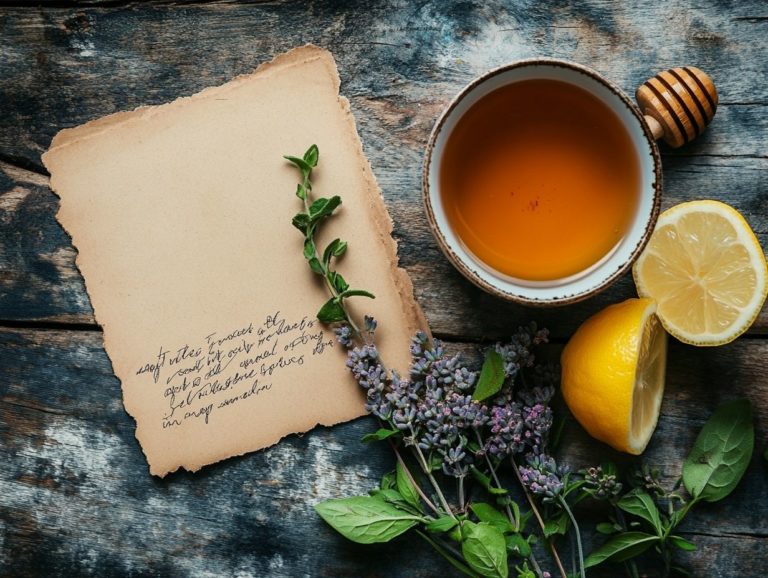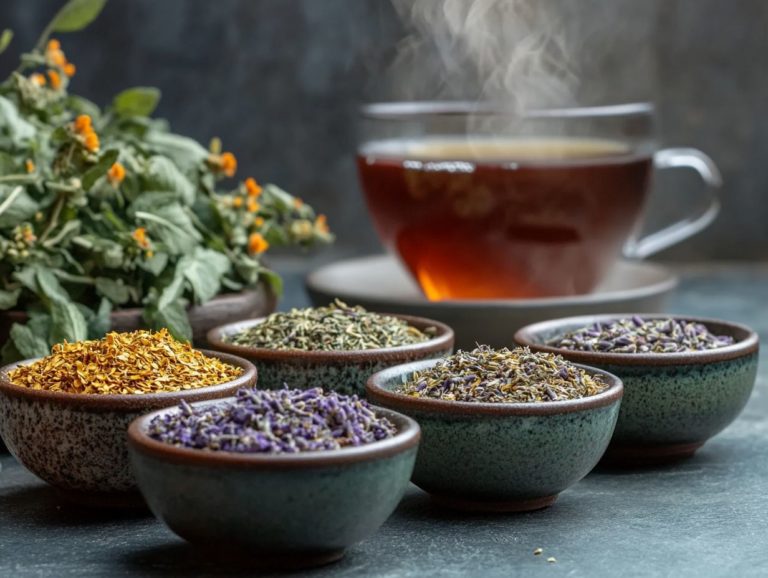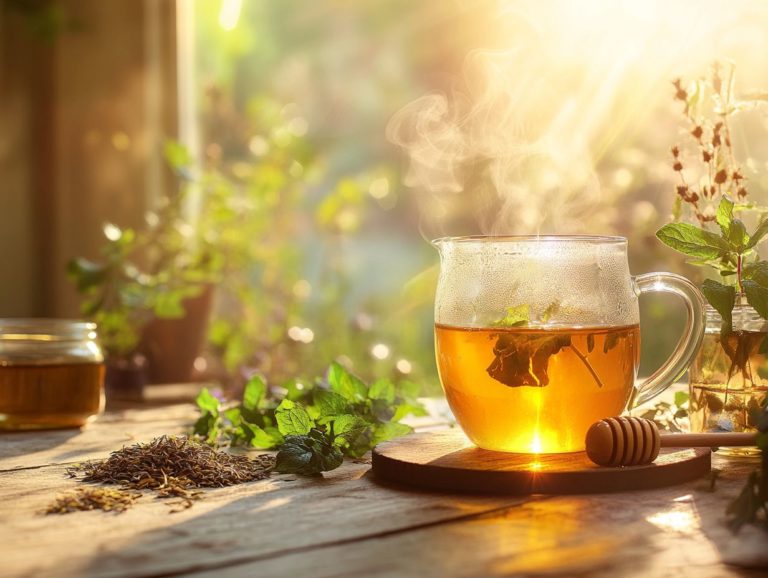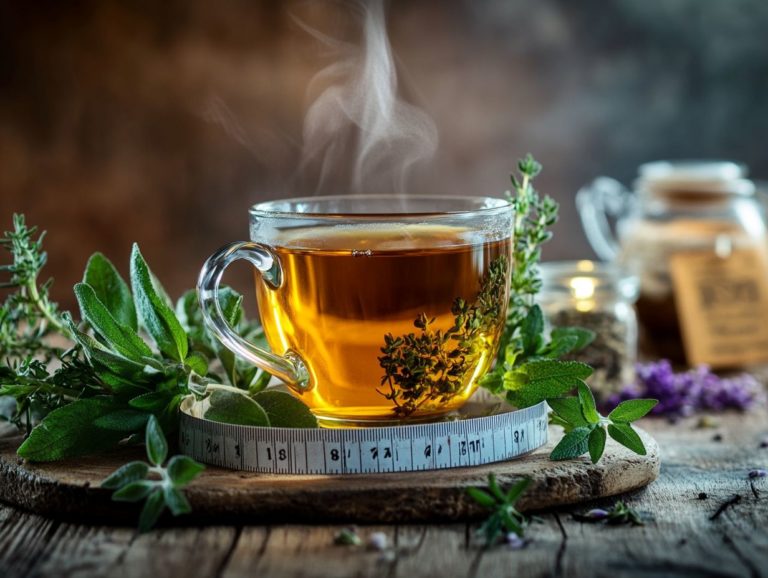The Science Behind Herbal Tea Benefits
Herbal tea is a delightful blend of various herbs, flowers, and spices. It is often seen as a hydrating beverage, cherished not only for its soothing flavors but also for its remarkable health benefits.
This article explores the science behind these advantages, looking at the chemical composition of herbal teas, different types of herbal infusions, and their interactions in your body.
Popular varieties like chamomile, peppermint, ginger, and echinacea offer unique benefits that contribute to the overall health advantages of herbal tea. Want to discover how to select and brew the perfect cup tailored to your taste? Let s dive in!
Whether you re a dedicated herbal enthusiast or simply curious, you ll find something valuable in this exploration.
Contents
- Key Takeaways:
- The Science Behind Herbal Tea Benefits
- Common Types of Herbal Tea and Their Benefits
- How to Choose and Prepare Herbal Tea
- Frequently Asked Questions
- What is herbal tea and how does it differ from regular tea?
- How does herbal tea provide health benefits?
- What are some common herbs used in herbal tea and their health benefits?
- Are there any side effects of drinking herbal tea?
- Is it safe for pregnant or breastfeeding women to drink herbal tea?
- Can herbal tea cure illnesses?
Key Takeaways:
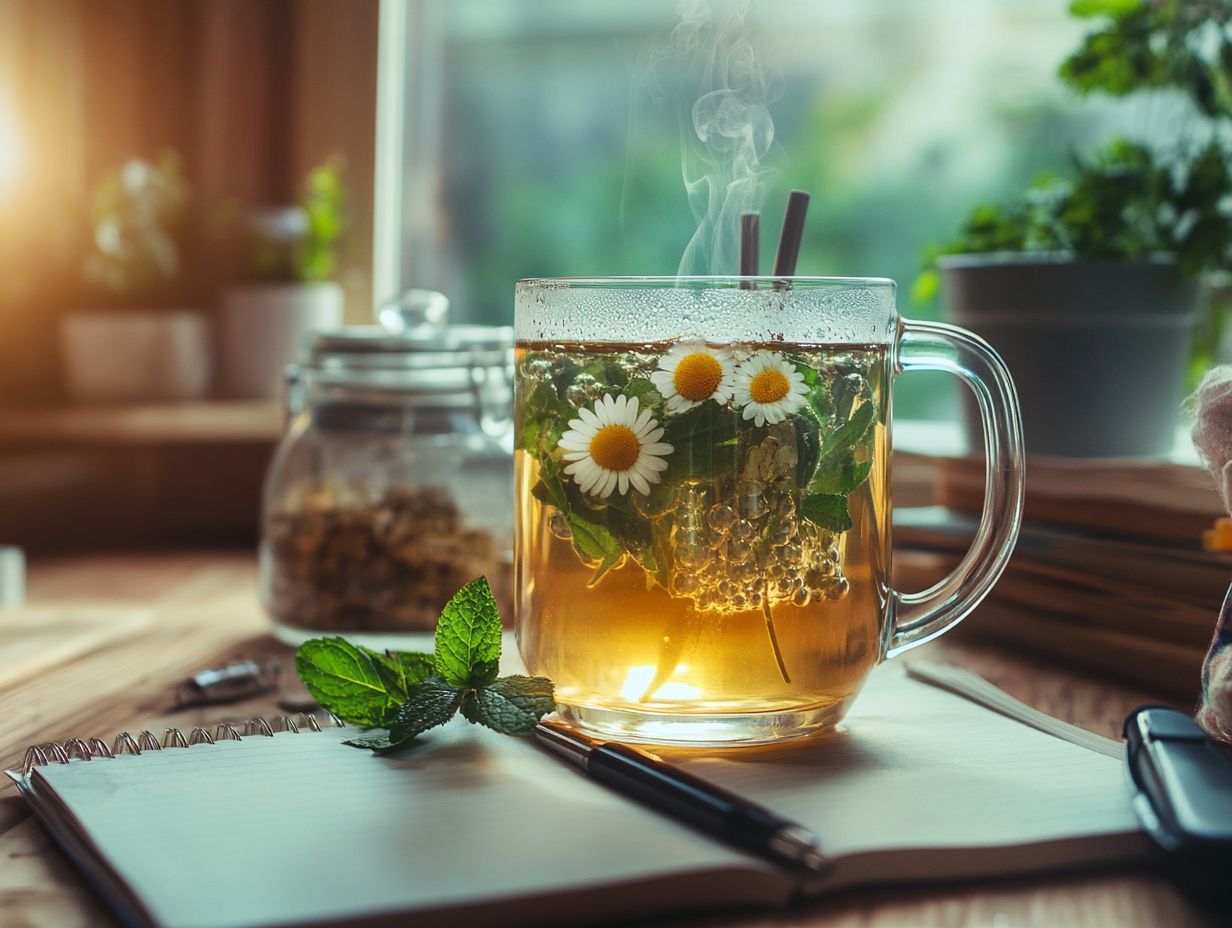
- Herbal tea is a natural beverage made from dried herbs, fruits, and flowers. It offers health benefits.
- These teas help reduce inflammation and boost immune function.
- Popular types like chamomile, peppermint, and ginger promote relaxation and aid digestion.
What is Herbal Tea?
Herbal tea doesn t come from the traditional tea plant, Camellia sinensis. Instead, it uses an array of herbs, flowers, and spices. This variety offers unique flavors and health benefits. Consider the calming allure of Chamomile, the anti-inflammatory properties of Ginger, and the antioxidant qualities of Hibiscus. Together, they create a rich tapestry of potential health advantages that enhance your overall well-being through hydration and natural remedies.
Unlike conventional teas, which often come with a caffeine kick, herbal infusions are delightfully caffeine-free and feature enjoyable ingredients like peppermint, rooibos, and lemon balm. Each type of herbal tea caters to specific needs, whether for relaxation or digestive support. This versatility makes them great companions for your daily routine.
The hydrating qualities of these infusions, combined with an abundant variety of botanicals, make them excellent choices for anyone seeking to enhance hydration while enjoying the holistic benefits of plant-based ingredients.
The unique combinations in each blend can cater to your specific health needs, enriching your wellness journey and inviting you to explore the many facets of herbal delights.
The Science Behind Herbal Tea Benefits
The science behind the benefits of herbal tea is a fascinating field explored by USDA scientists and researchers. They investigate the bioactive compounds in these beverages, revealing their potential to enhance health and well-being.
Herbal teas are rich in antioxidants, natural compounds found in plants, and other beneficial substances. For instance, the benefits of green tea highlight how these elements play a crucial role in promoting health advantages, including a stronger immune function and reduced inflammation.
Chemical Composition of Herbal Tea
The chemical composition of herbal tea includes various antioxidants, polyphenols, vitamins, and minerals. Each contributes to the unique flavors and health benefits of different types. For instance, chamomile tea is packed with flavonoids, while hibiscus tea is rich in anthocyanins. These compounds support your overall wellness.
These components not only satisfy your taste buds but also provide numerous health advantages. For example, green tea is abundant in catechins, known for their strong antioxidant properties that may aid in weight management and support cardiovascular health. In contrast, peppermint tea is refreshing due to menthol, which assists in digestion. It’s also interesting to explore herbal tea vs. traditional tea to understand their key differences and benefits.
Moreover, rooibos tea contains a unique blend of minerals like calcium and magnesium, enhancing its flavor while providing additional health benefits. By exploring the intricate composition of these elements, you can truly appreciate both the flavors and the holistic advantages that each herbal infusion brings to your life.
How Herbal Tea Works in the Body
Herbal tea works in your body through various mechanisms, where natural compounds stimulate your immune system, reduce inflammation, and promote health benefits. The specific effects depend on the type of herbal tea you choose. For instance, Chamomile can enhance your sleep quality, while Ginger tea aids in digestive health.
These natural compounds play crucial roles in modulating body systems and contribute to benefits like improved blood pressure and a stronger immune response. Take peppermint tea, for example! Its antioxidants enhance your respiratory function and help clear congestion. Meanwhile, the anti-inflammatory properties of Turmeric tea might relieve joint pain and improve mobility. For those interested in exploring further, the art of herbal tea blending can provide delightful ways to combine these benefits.
Echinacea is famous for its immune-boosting qualities. It effectively prompts your immune cells to respond more quickly to pathogens. These interactions show how enjoying different herbal teas can quench your thirst and serve as a valuable ally in supporting your overall well-being, as highlighted in herbal tea and its role in holistic health!
Common Types of Herbal Tea and Their Benefits
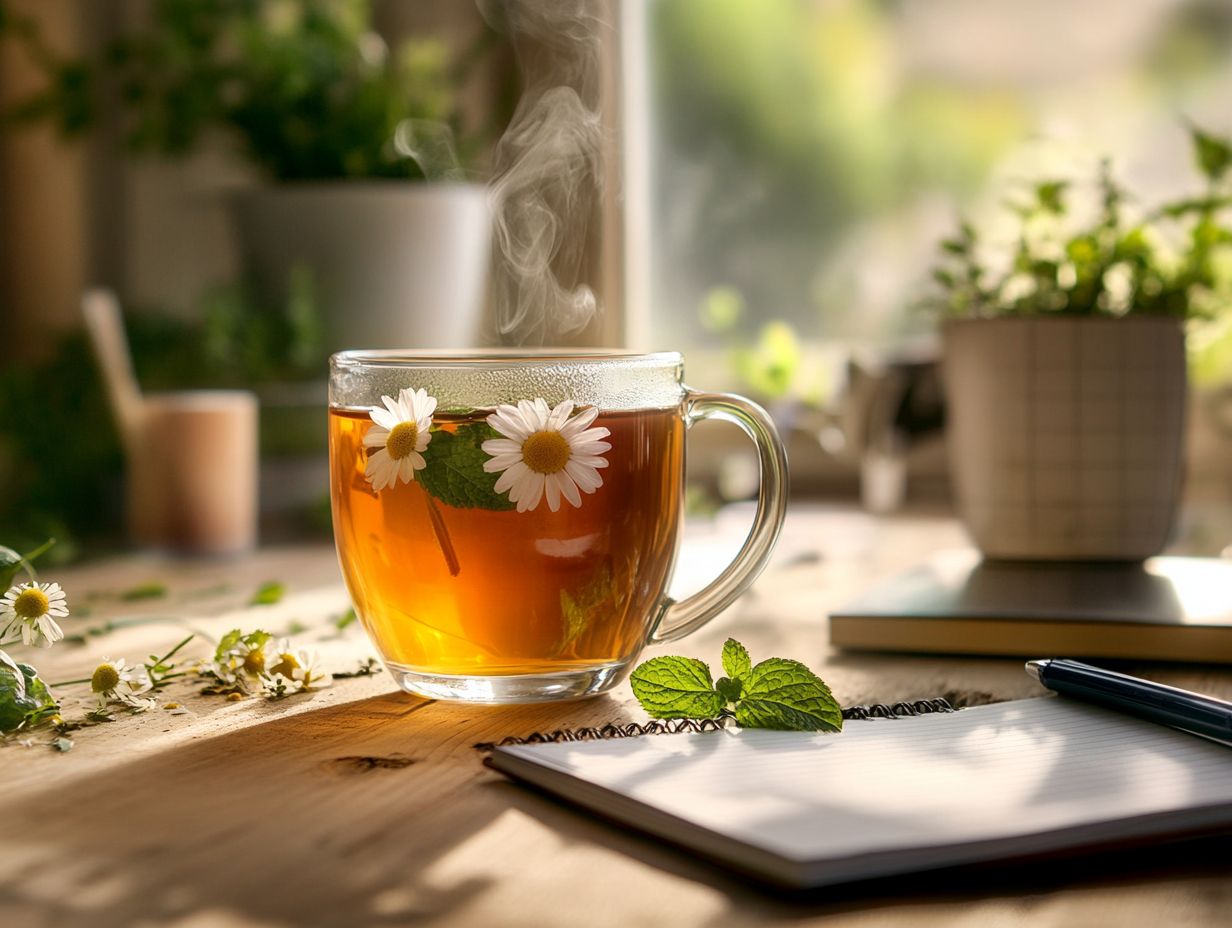
Common types of herbal tea you might enjoy include Chamomile, Peppermint, Ginger, and Echinacea. Each offers distinct flavors and a variety of health benefits.
Chamomile is a fantastic choice for relaxation! It is celebrated for its calming effects. Peppermint, on the other hand, is perfect for aiding digestion. Ginger shines with its anti-inflammatory properties, while Echinacea often becomes your ally in boosting the immune system.
Each of these herbal teas tantalizes your taste buds and supports your well-being in its unique way!
Chamomile Tea
Chamomile tea, made from the delicate flowers of the Chamomile plant, is well-known for its calming effects and ability to enhance sleep quality. It s your go-to herbal tea for relaxation! Rich in antioxidants and flavonoids, Chamomile offers benefits like reducing inflammation and aiding digestion.
This fragrant brew stands out due to its unique chemical composition. It features apigenin, a natural antioxidant that binds to specific receptors in the brain. This promotes serenity and tranquility. Traditionally, it has served as a natural remedy for sleep disorders and anxiety, often recommended to those grappling with insomnia. For those interested in a holistic approach, herbal tea: a natural approach to wellness can be a great addition to your routine.
Research shows that drinking Chamomile tea regularly can greatly improve your sleep quality! You can wake up feeling refreshed and rejuvenated.
The tea s anti-inflammatory properties also bolster digestive health and strengthen your immune system, making it a delightful addition to your wellness routine.
Peppermint Tea
Peppermint tea, with its invigorating aroma and delightful flavor, is a go-to choice for enhancing digestive health and easing stomach discomfort. The menthol in peppermint acts as a muscle relaxant, providing relief from digestive issues while promoting overall wellness.
This enchanting beverage combines refreshing coolness with a hint of sweetness. It s not just a soothing remedy but also a delightful treat for your taste buds! Many find that enjoying a cup of peppermint tea after meals helps reduce bloating and gas, as its natural properties ease tension in the gastrointestinal tract.
Research suggests the aroma of peppermint can elevate your mood and boost cognitive performance. This transforms a simple cup of tea into a truly therapeutic experience. For those interested in enhancing their mental clarity, exploring herbal teas for enhanced cognitive function can be beneficial. Anecdotal evidence supports that regular consumption leads to greater comfort and ease in digestion, solidifying peppermint tea’s status as a beloved staple in holistic health!
Ginger Tea
Ginger tea comes from the roots of the ginger plant. It is known for its anti-inflammatory properties and its ability to aid digestion, making it a favorite herbal tea in the wellness community.
Packed with antioxidants and natural compounds that benefit your health, ginger tea not only supports your digestive health but may also help alleviate nausea and boost your immune function.
Its soothing flavor strikes a delightful balance between spicy and earthy, offering a comforting choice for those seeking a warm beverage. You can get ready to enjoy a warm cup by steeping fresh ginger slices in hot water or opting for dried ginger powder.
Research has shown ginger s effectiveness in alleviating symptoms of indigestion and bloating. This reinforces its long-standing role in traditional medicine.
With its potent anti-inflammatory properties, ginger tea may provide relief from muscle soreness and joint pain. This makes it a versatile drink that promotes overall health.
Echinacea Tea
Echinacea tea, a well-known herbal infusion, is sourced from the Echinacea plant. It is celebrated for its ability to enhance the immune system and combat colds and infections.
During the cold and flu season, many individuals seek natural remedies, and Echinacea often makes an appearance due to its significant health benefits, which are supported by various studies.
Historically, many indigenous cultures have harnessed Echinacea for its healing properties, establishing it as a staple in natural medicine cabinets. Clinical research suggests that this herbal infusion may shorten the duration of illness, especially when combined with other herbal teas.
To prepare Echinacea tea, simply steep dried flowers, leaves, or roots in hot water. The flavor can vary significantly based on the brewing process, often described as slightly earthy with floral undertones.
This rich beverage not only supports your wellness journey but also offers a delightful, aromatic experience. You can further enhance your tea with additional flavors like lemon or honey.
How to Choose and Prepare Herbal Tea
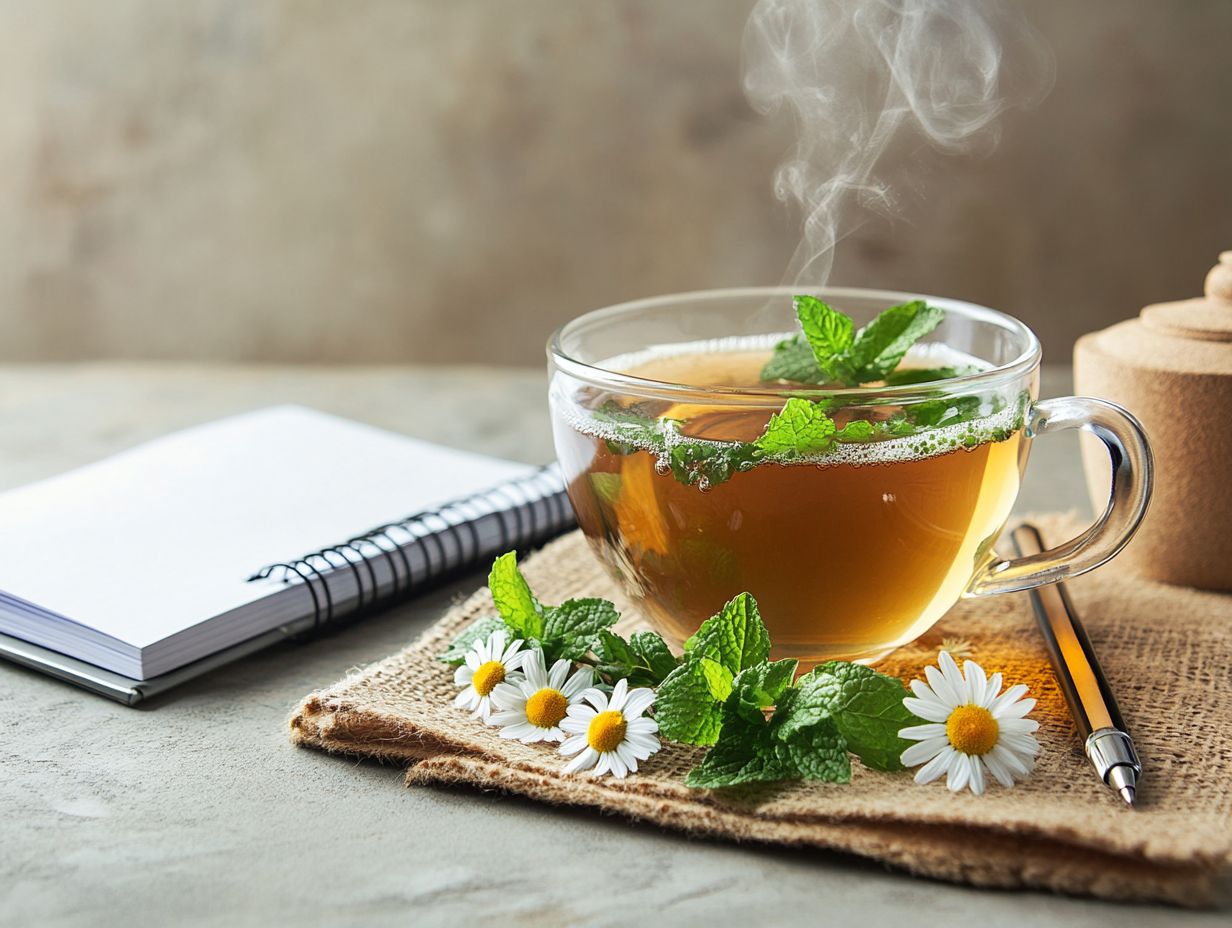
Choosing and preparing herbal tea requires understanding the unique qualities of various herbs. You also need the expertise to brew them correctly for optimal flavor and health benefits.
The unique antioxidants present in herbal infusions contribute to their effectiveness against cancer risk. Regular consumption of antioxidant-rich teas can be beneficial.
By selecting high-quality tea leaves and employing the right brewing techniques, you can significantly enhance your experience. Enjoy both the delightful taste and the therapeutic properties that each cup offers.
Tips for Selecting Quality Herbal Tea
When selecting quality herbal tea, consider freshness and sourcing from reputable suppliers known for their tea leaves. These factors significantly influence the flavor and health benefits you ll enjoy.
Aim for organic herbal teas, especially if you’re concerned about pesticides and caffeine intake. Sourced from reliable suppliers, these teas ensure you re indulging in the finest quality available.
Freshness is crucial; ideally, consume your herbal tea within a year of its harvest to fully appreciate its vibrant flavors and potent properties. To enhance your experience, consider reading about how to spice up your herbal tea. Look for packaging that specifies the harvest date instead of just an expiration date, as this provides a clearer picture of the tea’s age.
Labels should clearly indicate any organic certifications, assuring you of the quality and safety of the tea you choose. This gives you peace of mind that harmful pesticides or chemicals were not used during cultivation.
Understanding where your tea comes from is equally important. Teas from renowned regions often have robust flavors and can support cardiovascular health when consumed regularly.
Seek out teas packaged in airtight containers, which help keep herbal teas fresh and rich in bioactive compounds. Take a moment to examine ingredient lists to ensure there are no unnecessary additives that could compromise the health benefits of the tea.
Dive into the exciting adventure of discovering the perfect herbal tea that truly meets your standards.
Proper Brewing Techniques
Proper brewing techniques are essential for maximizing both flavor and health benefits when preparing herbal tea. Each herb demands specific water temperatures and steeping times to ensure optimal extraction of healthy compounds.
For instance, delicate herbs like chamomile or mint flourish at lower temperatures aim for around 190 F and steep them for 5 to 7 minutes. This allows their subtle flavors to shine through without turning bitter.
On the other hand, robust varieties such as ginger or hibiscus thrive under boiling water, around 212 F, with steeping times extending to 10 minutes or more. This lets the bold spices release their full essence.
If you’re just starting out, pre-packaged tea bags offer convenience, but they may lack the full flavor provided by loose leaf teas, which are often richer in antioxidants and beneficial compounds.
Once you re ready to elevate your experience, consider experimenting with loose leaf teas, perhaps using a mesh infuser an essential tool for brewing high-quality herbal teas. A little touch of lemon or honey after brewing can elevate the taste, transforming even the simplest cup into a delightful experience.
Frequently Asked Questions
What is herbal tea and how does it differ from regular tea?
Herbal tea is an infusion made from herbs, spices, or fruits, and does not contain any tea leaves from the Camellia sinensis plant. This makes it different from regular tea, which is made from these tea leaves.
How does herbal tea provide health benefits?
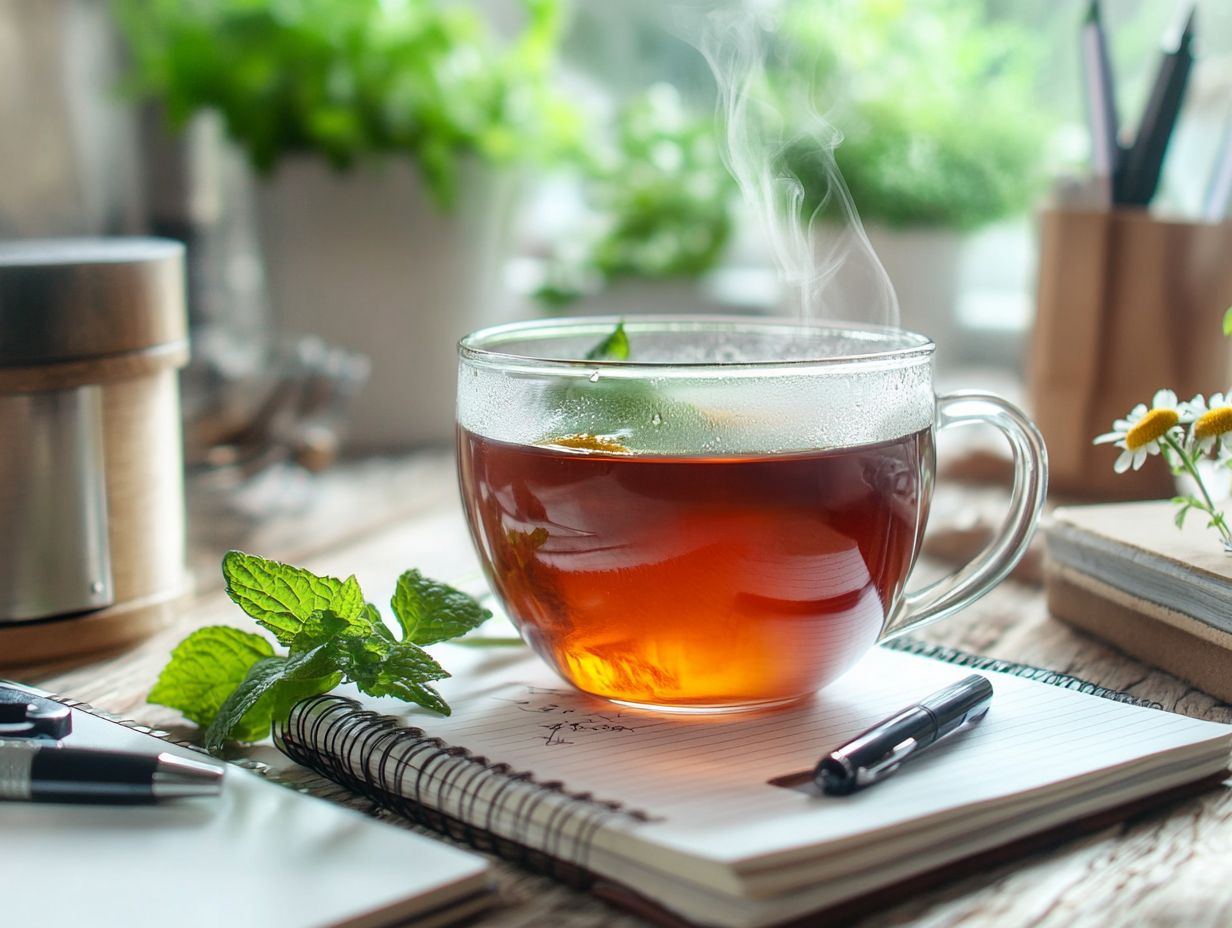
Herbal teas contain healthy compounds, which are naturally occurring substances found in plants. These compounds offer various health benefits, including aiding digestion, relieving stress, and boosting the immune system.
Consider exploring different herbal teas and experimenting with brewing techniques to find your favorite flavors!
What are some common herbs used in herbal tea and their health benefits?
Common herbs in herbal tea include chamomile, peppermint, ginger, and turmeric. Chamomile helps you relax and sleep, while peppermint aids digestion.
Ginger is great for nausea and inflammation. Turmeric helps reduce swelling and pain.
Are there any side effects of drinking herbal tea?
Herbal tea is generally safe for most people. However, some herbs might interact with medications or cause negative effects for certain individuals.
Always consult with a healthcare professional before making herbal tea a regular part of your routine.
Is it safe for pregnant or breastfeeding women to drink herbal tea?
Some herbal teas may not be safe during pregnancy or breastfeeding. Certain herbs can stimulate the uterus or affect milk production.
It s essential to talk to a healthcare professional before consuming herbal tea in these situations.
Can herbal tea cure illnesses?
Herbal tea has health benefits but is not a cure for illnesses. For proper treatment, always consult with a healthcare professional.

